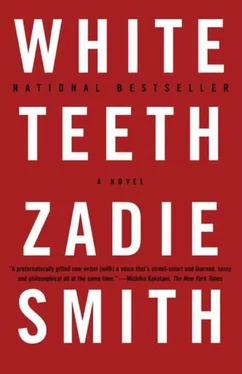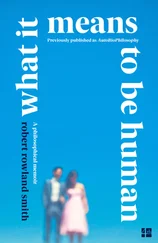You lookin’ at me? You lookin’ at me?
Well, who the fuck else are you looking at, huh?
I can’t see anybody else in here.
You lookin’ at me?
He was in the swing of it, revealing his invisible sliding guns and knives to the wardrobe door, when Irie walked in.
‘Yes,’ said Irie, as he stood there sheepish. ‘I’m looking at you.’
Quickly and quietly she explained to him about the neutral place, about the room, about the date, about the time. She made her own personal plea for compromise, peace and caution (everybody was doing it) and then she came up close and put the cold key in his warm hand. Almost without meaning to, she touched his chest. Just at the point between two belts where his heart, constricted by the leather, beat so hard she felt it in her ear. Lacking experience in this field, it was natural that Irie should mistake the palpitations that come with blood restriction for smouldering passion. As for Millat, it had been a very long time since anybody touched him or he touched anybody. Add to that the touch of memory, the touch of ten years of love unreturned, the touch of a long, long history – the result was inevitable.
Before long their arms were involved, their legs were involved, their lips were involved, and they were tumbling on to the floor, involved at the groin (hard to get more involved than that), making love on a prayer mat. But then as suddenly and feverishly as it had begun it was over; they released each other in horror for different reasons, Irie springing back into a naked huddle by the door, embarrassed and ashamed because she could see how much he regretted it; and Millat grabbing his prayer mat and pointing it towards the Kaba, ensuring the mat was no higher than floor level, resting on no books or shoes, his fingers closed and pointing to the quibla in line with his ears, ensuring both forehead and nose touched the floor, with two feet firmly on the ground but ensuring the toes were not bent, prostrating himself in the direction of the Kaba, but not for the Kaba, but for Allahu ta’ala alone. He made sure he did all these things perfectly, while Irie wept and dressed and left. He made sure he did all these things perfectly because he believed he was being watched by the great camera in the sky. He made sure he did all these things perfectly because they were fard and ‘he who wants to change worships becomes a disbeliever’ (leaflet: The Straight Path ).
Hell hath no fury et cetera, et cetera . Irie walked hot-faced from the Iqbal house and headed straight for the Chalfens with revenge on her mind. But not against Millat. Rather in defence of Millat, for she had always been his defender, his blacky-white knight. You see, Millat did not love her. And she thought Millat didn’t love her because he couldn’t. She thought he was so damaged, he couldn’t love anybody any more. She wanted to find whoever had damaged him like this, damaged him so terribly; she wanted to find whoever had made him unable to love her .
It’s a funny thing about the modern world. You hear girls in the toilets of clubs saying, ‘Yeah, he fucked off and left me. He didn’t love me. He just couldn’t deal with love. He was too fucked up to know how to love me.’ Now, how did that happen? What was it about this unlovable century that convinced us we were, despite everything, eminently lovable as a people, as a species? What made us think that anyone who fails to love us is damaged, lacking, malfunctioning in some way? And particularly if they replace us with a god, or a weeping madonna, or the face of Christ in a ciabatta roll – then we call them crazy. Deluded. Regressive. We are so convinced of the goodness of ourselves, and the goodness of our love, we cannot bear to believe that there might be something more worthy of love than us, more worthy of worship. Greetings cards routinely tell us everybody deserves love. No. Everybody deserves clean water. Not everybody deserves love all the time.
Millat didn’t love Irie, and Irie was sure there must be somebody she could blame for that. Her brain started ticking over. What was the root cause? Millat’s feelings of inadequacy. What was the root cause of Millat’s feelings of inadequacy? Magid. He had been born second because of Magid. He was the lesser son because of Magid.
Joyce opened the door to her and Irie marched straight upstairs, maliciously determined to make Magid the second-son for once, this time by twenty-five minutes. She grabbed him, kissed him and made love to him angrily and furiously, without conversation or affection. She rolled him around, tugged at his hair, dug what fingernails she had into his back and when he came she was gratified to note it was with a little sigh as if something had been taken from him. But she was wrong to think this a victory. It was simply because he knew immediately where she had been, why she was here, and it saddened him. For a long time they lay in silence together, naked, the autumn light disappearing from the room with every minute that passed.
‘It seems to me,’ said Magid finally, as the moon became clearer than the sun, ‘that you have tried to love a man as if he were an island and you were shipwrecked and you could mark the land with an X. It seems to me it is too late in the day for all that.’
Then he gave her a kiss on the forehead that felt like a baptism and she wept like a baby.
3 p.m., 5 November 1992. The brothers meet (at last ) in a blank room after a gap of eight years and find that their genes, those prophets of the future, have reached different conclusions. Millat is astounded by the differences. The nose, the line of the jaw, the eyes, the hair. His brother is a stranger to him and he tells him so.
‘Only because you wish me to be,’ says Magid with a crafty look.
But Millat is blunt, not interested in riddles, and in a single shot asks and answers his own question. ‘So you’re going through with it, yeah?’
Magid shrugs. ‘It is not mine to stop or start, brother, but yes, I intend to help where I can. It is a great project.’
‘It is an abomination.’ (leaflet: The Sanctity of Creation )
Millat pulls out a chair from one of the desks and sits on it backwards, like a crab in a trap, legs and arms splayed either side.
‘I see it rather as correcting the Creator’s mistakes.’
‘The Creator doesn’t make mistakes.’
‘So you mean to continue?’
‘You’re damn right.’
‘And so do I.’
‘Well, that’s it, then, isn’t it? It’s already been decided. KEVIN will do whatever is necessary to stop you and your kind. And that’s the fucking end of it.’
But contrary to Millat’s understanding, this is no movie and there is no fucking end to it, just as there is no fucking beginning to it. The brothers begin to argue. It escalates in moments, and they make a mockery of that idea, a neutral place; instead they cover the room with history – past, present and future history (for there is such a thing) – they take what was blank and smear it with the stinking shit of the past like excitable, excremental children. They cover this neutral room in themselves. Every gripe, the earliest memories, every debated principle, every contested belief.
Millat arranges the chairs to demonstrate the vision of the solar system which is so clearly and remarkably described in the Qur’ān, centuries before Western science (leaflet: The Qur’ān and the Cosmos ); Magid draws Pande’s parade ground on one blackboard with a detailed reconstruction of the possible path of bullets, and on the other board a diagram depicting a restriction enzyme cutting neatly through a sequence of nucleotides; Millat uses the computer as television, a chalk rubber as the picture of Magid-and-goat, then single-handedly impersonates every dribbling babba, great aunt and cousin’s accountant who came that year for the blasphemous business of worshipping an icon; Magid utilizes the overhead projector to illuminate an article he has written, taking his brother point-by-point through his argument, defending the patents of genetically altered organisms; Millat uses the filing cabinet as a substitute for another one he despised, fills it with imaginary letters between a scientist Jew and an unbelieving Muslim; Magid puts three chairs together and shines two anglepoise lamps and now there are two brothers in a car, shivering and huddled together until a few minutes later they are separated for ever and a paper plane takes off.
Читать дальше












